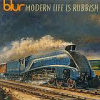Originally Published on L.S. Media. 30th July 2012.
If you are going to redefine yourself, whether as a human being or even that special breed that is at best casually derived and described as artistic and often much worse, then its best to do it before audiences put you in the box marked interesting in small doses but ultimately no future.
Blur’s second album, Modern Life Is Rubbish, does just that for the band. It was the beginning of the backlash against the American sound that crept silently into the bedrooms and more frighteningly the minds and thoughts of bored British teenagers. Grunge was taking hold and whilst some of the bands were good, it doesn’t help to have an alien influence taking hold when the natural home grown bands had a voice, especially when it didn’t know how to use it to great effect.
The 90’s were almost a barren time for some music lovers, nothing new really making great strides into the consciousness and what was coming through had American influence. There were some bands that got the proverbial foot in the door but with Modern Life Is Rubbish a musical embryonic state was started. The nucleus and taste of what was to eventually become Brit-Pop and whilst even some of what was recorded in that time was the equivalent of the worst excess of 70’s punk, gems were starting to show.
Whereas the band’s debut album should be avoided in lots of ways, Modern Life…saw Damon Albarn find his voice, albeit a tender, soft and less critical and sneering of what would be fondly remembered, it was at least a voice that fans could now get behind. The music too became tighter, more adept. Gone was the frightened mewing and cocky attitude, Modern Life… saw the four band members actually playing as one and at the same time, taking life with just that little bit of seriousness that is needed to succeed.
Whilst there was still obvious work to be done in presenting style, the opener to the album For Tomorrow showed how the group had evolved. The song, instead of being a self centred navel gaze has the hallmarks of looking at the world with more adult eyes, a taste to tell a story rather than moan about the life we lead. In its way, it shows a level of maturity that their counterparts in America were not yet capable of. Of the American musicians at the time that were starting to break through, only Tori Amos could be said to show the same type of musical leaning and depth of musical layering.
Advert was a difficult one to follow up on the album. Whilst For Tomorrow was undoubtedly a lovely and depth ridden tune, Advert flounders, it wants to be two things in one confusing shell which sort of sums up the album. It can be wonderfully good, a real sign of artistic maturity and then at times, such as in Advert where it nods both the musical styling’s of pops of the likes of O.M.D. and the punk driven voice of John Lydon. As separate entities that would have been fine, musically inoffensive and hardly groundbreaking but fine. Together it becomes a little messy, like an incompatible couple raging over a night at the opera or staying at home and watching the banality of so called music talent shows. Never the twain should meet and certainly not in the confines of a record.
On the whole, Modern Life…is far from rubbish, it has the advantage of being a far more interesting album that its predecessor and one that gives a good insight into the real Blur.
Ian D. Hall

